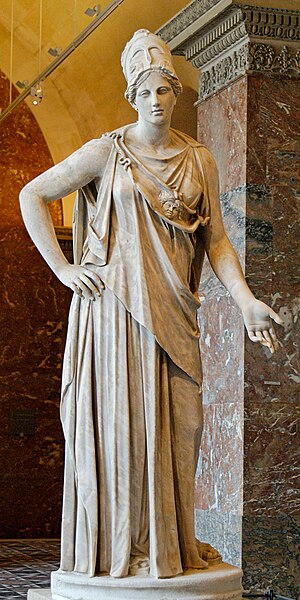Athena or Athene, often given the epithet Pallas, is an ancient Greek goddess associated with wisdom, warfare, and handicraft who was later syncretized with the Roman goddess Minerva. Athena was regarded as the patron and protectress of various cities across Greece, particularly the city of Athens, from which she most likely received her name. The Parthenon on the Acropolis of Athens is dedicated to her. Her major symbols include owls, olive trees, snakes, and the Gorgoneion. In art, she is generally depicted wearing a helmet and holding a spear.
Mattei Athena at Louvre. Roman copy from the 1st century BC/AD after the Greek original Piraeus Athena of the 4th century BC attributed to Cephisodotos or Euphranor.
The Acropolis at Athens (1846) by Leo von Klenze. Athena's name probably comes from the name of the city of Athens.
Fragment of a fresco from the Cult Center at Mycenae dating the late thirteenth century BC depicting a warrior goddess, possibly Athena, wearing a boar's tusk helmet and clutching a griffin.
Ancient Akkadian cylinder seal (dating c. 2334–2154 BC) depicting Inanna, the goddess of war, armored and carrying weapons, resting her foot on the back of a lion
Religious practices in ancient Greece encompassed a collection of beliefs, rituals, and mythology, in the form of both popular public religion and cult practices. The application of the modern concept of "religion" to ancient cultures has been questioned as anachronistic. The ancient Greeks did not have a word for 'religion' in the modern sense. Likewise, no Greek writer known to us classifies either the gods or the cult practices into separate 'religions'. Instead, for example, Herodotus speaks of the Hellenes as having "common shrines of the gods and sacrifices, and the same kinds of customs."
Aegeus at right consults the Pythia or oracle of Delphi. Vase, 440–430 BCE. He was told "Do not loosen the bulging mouth of the wineskin until you have reached the height of Athens, lest you die of grief", which at first he did not understand.
Aphrodite riding a swan: Attic white-ground red-figured kylix, c. 460, found at Kameiros (Rhodes)
Asclepios, god of medicine. Marble Roman copy (2nd century CE) of a Greek original of the early 4th century BCE. Asclepios was not one of the Twelve Olympians, but popular with doctors like Pausanias, and their patients.
The Judgment of Paris by Peter Paul Rubens (c. 1636), depicting the goddesses Hera, Aphrodite and Athena, in a competition that causes the Trojan War. This Baroque painting shows the continuing fascination with Greek mythology








